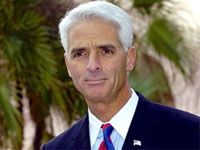Crist’s top three priorities of 2008 legislative session
Charlie Crist, an American politician of the Republican Party and the current Governor of Florida, on Tuesday proposed reducing the number of Floridians living without health insurance by creating coverage options that he said would cost less than half what individual policyholders have to pay.

Crist included the package as part of what he called his top three priorities of the 2008 legislative session, which begins next month. Other measures include energy conservation and education reforms, including a requirement that counties spend more school dollars in the classroom.
Crist said his approach focused on simple concepts and avoided more controversial requirements included in other states' plans.
Crist's Cover
A catastrophic care plan, for example, could cover hospitalization, tests, immunizations and other conventional services, but limit them over a patient's lifetime to shorten anticipated costs and lower rates.A proposed noncatastrophic plan would be even cheaper, not covering hospitalization or specific services that a younger, healthy individual may choose to drop.
But for insurers, the plan still has drawbacks. It would force them to guarantee coverage to any uninsured Floridians age 19 to 64, without screening out those with health problems.
Randy Kammer, vice president of Blue Cross/Blue Shield of Florida, warned that some insurers might enter the market offering lowball rates that aren't sustainable, endangering coverage for those newly insured patients.
Crist also wants to broaden the state's popular KidCare subsidized health insurance program by allowing all children to be eligible, instead of only those whose family incomes are below roughly $40,000 a year. But families with higher incomes would pay full price under the plan.
Crist also intends to increase the number of dentists serving Medicaid patients by raising reimbursement rates by 23 %.
Crist expects to meet resistance by embracing a plan once pushed by former Gov.
National studies have shown Florida schools on average spend less than 60 % on classroom costs -- though even proponents concede that the definition of "classroom expenditure" is debatable. Efforts by Bush to get a similar plan through the Legislature failed.
Crist's advocacy is clearly intended to show a focus on the classroom in a year when Florida is facing as much as $2.5 billion in cuts next year to the state's $70 billion budget.
"It operates off a wrong assumption," said Mark Pudlow, spokesman for the Florida Education Association, the state's largest teachers union. "It assumes that there's enough money for education, and that it's just being wasted."
Central Florida school districts were reluctant to comment without more specific guidelines.
"It all depends on how they define direct 'instruction,' " said Bill Collins, Osceola County 's assistant superintendent for fiscal and business services. “A lot of things are part of getting students educated."
Several districts have already reached the 65 % threshold.
The third plank of Crist's priorities -- combating climate change -- was mostly unveiled last year. He aims to curtail greenhouse gases, improve vehicle fuel efficiency and harness solar and wind energy, mandating new rules for utilities and $200 million in incentives for alternative energy.
One proposal, for example, would require utilities to meet 20 % of new energy demand with conservation and efficiency.
Tommy Boroughs, chairman of the Legislature's Florida Energy Commission called it “a huge goal".
Subscribe to Pravda.Ru Telegram channel, Facebook, RSS!




